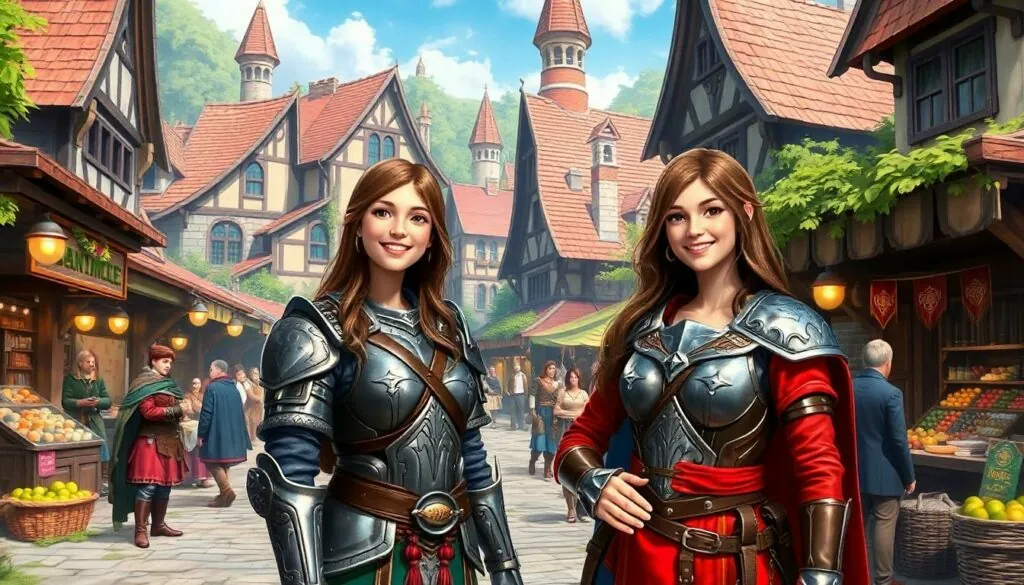In a world where epic quests and legendary battles await, browser-based MMORPGs have become the ultimate playground for gamers. Imagine diving into a universe where dragons soar and heroes are forged, all without the need for hefty downloads or powerful gaming rigs. It’s like finding a treasure chest in your attic—unexpected and oh-so-rewarding!
Table of Contents
ToggleOverview of Browser Based MMORPGs
Browser-based MMORPGs provide an engaging gaming experience without requiring extensive downloads or high-performance hardware. Players access these games directly through internet browsers, eliminating barriers associated with traditional installations. These games often incorporate vibrant graphics and immersive storylines, enhancing the appeal to a broad audience.
Many browser-based MMORPGs feature real-time multiplayer interactions. Users can team up with friends or engage with players around the globe. Quests often revolve around character growth, exploration, and combat, offering various gameplay styles that cater to different preferences.
Customization of characters tends to play a significant role in these games, allowing players to tailor avatars with unique traits and appearances. Choices made in character design often impact gameplay, promoting individual creativity and strategic thinking.
Economy systems within browser-based MMORPGs frequently create dynamic marketplaces. Players engage in trading or crafting, fostering a robust in-game community. Events and updates commonly introduce new content, keeping the gaming experience fresh and exciting.
With advancements in web technology, graphics and gameplay mechanics have improved significantly. These improvements ensure that browser-based MMORPGs can compete with their client-based counterparts. Engaging environments filled with quests and challenges continue to captivate players seeking adventure from anywhere with internet access.
Key Features of Browser Based MMORPGs
Browser-based MMORPGs offer several standout features that enhance their appeal. Players enjoy the convenience of accessing these games directly through their internet browsers, eliminating the need for large downloads or installations. This accessibility allows anyone with a stable internet connection to dive into the action without costly hardware constraints.
Accessibility and Convenience
Accessibility defines the core of browser-based MMORPGs. These games can run on various devices, including desktops, laptops, and even tablets, ensuring that players find a platform suitable for their needs. Players can switch between different devices seamlessly, picking up where they left off without any hassle. The absence of extensive installation processes further simplifies access, inviting new players to explore vast game worlds quickly. Social interaction thrives as friends can join each other easily, making spontaneous gaming sessions simple and fun.
Graphics and Performance
Graphics in browser-based MMORPGs have seen significant advancements. Modern web technologies allow developers to create vibrant, engaging environments that rival traditional client-based games. Players enjoy smooth animations and detailed character designs thanks to optimized performance across different internet browsers. Performance enhancements ensure minimal lag, allowing for fluid gameplay during intense battles or collaborative quests. Developers continuously update graphics engines, ensuring that experiences remain immersive and visually captivating, even as tech evolves.
Popular Browser Based MMORPGs
Browser-based MMORPGs attract players with their captivating stories and engaging mechanics. Several titles stand out in this genre due to unique features and gameplay.
Game 1: Features and Gameplay
“Runescape” offers a vast open world filled with quests and iconic lore. Players craft their characters, choose skills, and explore interactive environments. Engaging in combat against various creatures enriches the experience, while regular updates introduce fresh content. Cooperative gameplay allows teaming up for challenging quests or skilling activities, enhancing community interaction. The game’s economy fosters trading, inviting players to engage significantly with each other.
Game 2: Features and Gameplay
“Albion Online” focuses on player-driven economies and class flexibility. Players can gather resources, craft items, or battle foes in territories they control. A unique feature is the lack of predetermined classes, allowing character specialization based on equipment choices. Engaging in guild warfare motivates players to form alliances and compete for territory. A player marketplace encourages trading, creating a dynamic economy that reflects player decisions and actions.
Game 3: Features and Gameplay
“DOFUS” combines stylish graphics with strategic turn-based combat. Players embark on quests filled with humor and challenge while controlling unique characters with distinct abilities. The game emphasizes PvP interactions, allowing for intense battles between clans. Cooperative play enhances the experience, as players can strategize together to conquer challenging dungeons. The rich lore and world-building elements provide depth, keeping players immersed in their adventures.
Advantages of Browser Based MMORPGs
Accessibility remains one of the main advantages of browser-based MMORPGs. Gamers can jump into their favorite titles without downloading large files, saving time and storage space. Convenience is evident as players can engage from any device with an internet connection, including laptops and tablets.
Social interaction enhances the gaming experience. Friends can easily join each other for spontaneous gaming sessions without cumbersome setup processes. This fosters a sense of community as players communicate and collaborate in real time.
Customization options allow users to create unique avatars tailored to their preferences. Players can experiment with different looks and abilities, enriching personal engagement within the game. In-depth character growth opportunities further attract those seeking diverse gameplay styles.
Engaging storylines coupled with vibrant graphics keep players immersed. Seamless updates introduce new content and events, ensuring the excitement persists. Players experience challenges and quests that evolve, catering to varied interests and skill levels.
Dynamic economy systems add another layer of depth. Within these environments, trading and crafting create rich interactions among players. This contributes to a thriving in-game community, where user-generated content flourishes.
Performance advancements in web technologies enhance the overall experience. Smooth animations and responsive design minimize lag, resulting in immersive gameplay. Gamers find enjoyment comparable to traditional client-based games, reinforcing the appeal of browser-based offerings.
Overall, these factors create a compelling gaming landscape. Browser-based MMORPGs continue to grow in popularity as they combine convenience, social interaction, and engaging content, making them an attractive choice for gamers worldwide.
Challenges Faced by Browser Based MMORPGs
Browser based MMORPGs encounter several challenges impacting their player experience. Limited graphics capabilities often hinder the visual appeal compared to client-based games, despite recent technological advancements. Players expect immersive environments, yet browser limitations can restrict detailed landscapes and character designs.
Server stability represents another critical issue. Many players face connectivity drops or lag, affecting gameplay. Consistent server performance is essential for maintaining an engaging multiplayer experience, but high traffic can overwhelm servers, leading to a less enjoyable experience for users.
Monetization strategies pose additional challenges. While free-to-play models attract a large player base, balancing monetization with fair gameplay remains complex. Players often resist aggressive monetization tactics, such as pay-to-win features, which can lead to discontent within the community.
Community engagement plays a significant role in the success of these games. Developers must continuously create fresh content and events to retain player interest. However, generating consistent and appealing content requires significant resources, creating a paradox where rushed updates may fail to meet player expectations.
Competition within the gaming market is fierce. Many new titles emerge regularly, attracting players with innovative features or unique gameplay mechanics. Browser based MMORPGs must evolve constantly, ensuring they remain relevant and appealing to potential players.
Finally, catering to mobile users poses its own set of challenges. Cross-platform compatibility is vital for reaching a broader audience. However, maintaining consistent gameplay experiences across devices can prove difficult. Game developers must strive to ensure that user interfaces and mechanics translate well from desktop to mobile formats.
Conclusion
Browser-based MMORPGs offer a unique blend of accessibility and excitement that continues to draw in gamers. With their engaging storylines and vibrant graphics players can dive into immersive worlds without the hassle of extensive downloads. The ability to customize characters and interact with a global community enhances the overall experience.
While challenges like graphics limitations and server stability exist developers are continually innovating to overcome these obstacles. The dynamic nature of these games ensures that players stay engaged with regular updates and events. As technology advances browser-based MMORPGs are set to remain a popular choice for those seeking adventure and camaraderie in gaming.









